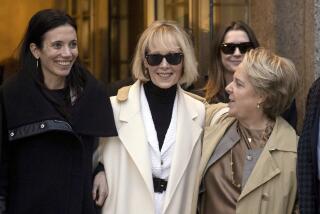Judge Slashes Huge Award in Smoking Case
- Share via
A Los Angeles judge Wednesday slashed a record punitive damages verdict against Philip Morris Cos. to $28 million, a hefty sum but a shadow of the $28 billion originally ordered by the jury.
Declaring the jury award to 64-year-old Betty Bullock, a longtime smoker with lung and liver cancer, “legally excessive,” Superior Court Judge Warren L. Ettinger ruled that $28 million “is a reasonable sum to be awarded against Philip Morris in these circumstances.”
But in his seven-page ruling, Ettinger denied two other motions by Philip Morris: a request to either order a new trial or to discard the jury’s verdict and declare the company not liable.
In rejecting the motions, Ettinger said Philip Morris had mounted almost no defense to claims that it had conspired with other cigarette makers to conceal the risks and addictiveness of smoking.
“During the course of the trial, the plaintiff called world-famous experts who established that it had been known since the 1950s that cigarette smoke caused lung cancer; that nicotine was a highly addictive drug; and that executives of Philip Morris were aware of these facts,” the ruling said.
“Plaintiff also proved that with this knowledge, Philip Morris constantly lied to its customers. Their executives continued on a course claiming there was ‘no certainty’ that their product caused disease or was addictive,” Ettinger wrote. “They made such claims to the public, to the Congress and to the media.... Philip Morris offered NO EVIDENCE refuting or denying any of these facts.”
William S. Ohlemeyer, Philip Morris vice president and associate general counsel, said the company would appeal because the verdict was “inconsistent with the facts and the law that should have governed this case.” In seeking a new trial, Philip Morris had claimed there was no evidence that Bullock relied on any misrepresentations by the company, which it said was a necessary ingredient in proving fraud.
Bullock, of Newport Beach, has the option of seeking a new trial solely on punitive damages or consenting to the reduced award by Dec. 27, the ruling said.
Her Lawyer, Michael Piuze, said he and Bullock had yet to confer on whether to accept the award. But he said he was “extremely disappointed in the magnitude” of the reduction.
“This is not a real punishment for Philip Morris,” Piuze said.
Legal observers said the reduction was a foregone conclusion because the punitive award was 33,000 times the $850,000 in compensatory damages given Bullock for economic losses, medical expenses and pain and suffering. Without explaining how he got there, Ettinger allowed one one-thousandth of the award to stand. The award had been the largest ever given to an individual plaintiff in U.S. history.
Ettinger had instructed the jury that punitive damages should be sufficient to deter future misconduct but also must bear some reasonable relationship to the compensatory damages awarded to a plaintiff. He acknowledged there is “no bright-line rule” for deciding when a punitive award is excessive, but cited a U.S. Supreme Court case in which justices said a 500-1 ratio must “raise a suspicious judicial eyebrow.”
Jury forewoman Jessica Gelson said she was disappointed by the size of the reduction. “We took days to deliberate and come to that number, and it was based very much on jury instructions.”
But another juror, Jose Farinas, reacted philosophically: “We did our job, and the judge is doing his job, and that’s how the legal system works.”
The Bullock case was the tobacco industry’s fourth straight loss in California at the hands of an individual smoker and, along with two losses in Oregon, its sixth straight West Coast defeat.
Even with Ettinger’s ruling, cigarette makers Philip Morris and R.J. Reynolds Tobacco Co. face $362 million in damage awards in the six cases. The other five are in various stages of appeal.
Ettinger’s ruling came after the close of trading on the New York Stock Exchange. Shares of New York-based Philip Morris rose 52 cents to $41.85 in after-hours trading.
More to Read
Inside the business of entertainment
The Wide Shot brings you news, analysis and insights on everything from streaming wars to production — and what it all means for the future.
You may occasionally receive promotional content from the Los Angeles Times.










